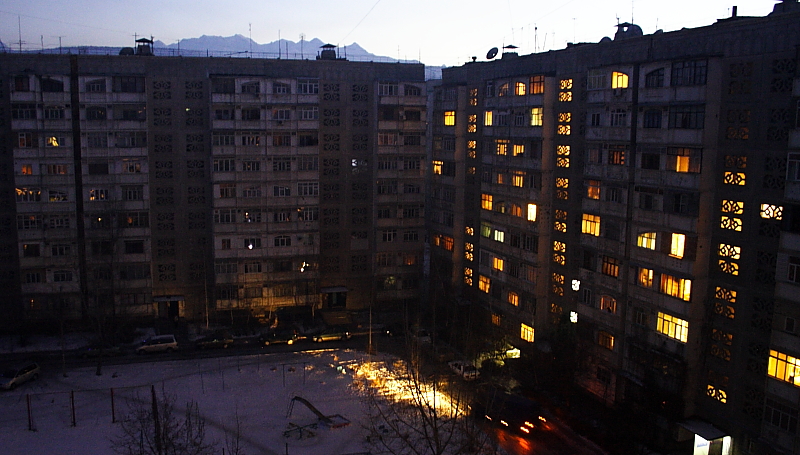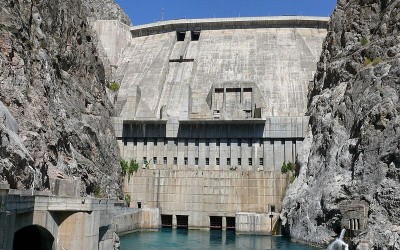
One block of appartments finds itself the wrong side of a Bishkek blackout. Photo by Kloop.kg.
Kyrgyz Internet users have called it their “Annual Groundhog Day”, a seeming time loop consisting of things a person does in the dark chill of a winter electricity shutoff.
In fact, in recent years, the country's failing energy grid has just about held up. But with national power supply depending on the water in a remote reservoir, and with those water levels being accutely low this year, there is plenty of reason to think a lucky run has come to its end.
The first time the country was plunged in the darkness was in 2008, when similarly low water levels in the Toktogul reservoir feeding the eponymous Hydro Electric Power (HEP) station caused rolling shutoffs across the country. Back then, many accused then President Kurmanbek Bakiyev of artificially causing the deficit by exporting electricity abroad. The following winter his regime added fuel to a spreading fire of social discontent by announcing massive price hikes for electricity bills. By spring the Bakiyevs had been violently ejected from power.
As Jocelyn Murphy, an independent energy consultant contracted by USAID, explained, the energy system remains vulnerable to collapse.
Too much electricity was exported from Kyrgyzstan 2002-2007. As a result, in 2008, Kyrgyzstan came to a “dead” level in the Toktogul reservoir of 5.5 billion cubic meters. The most desirable course of action is to impose a limit on electricity use for the population. If the local authorities cannot do this, equipment at Toktogul HEP station might stop working.

Kyrgyzstan's energy deficit has been on the front pages of local news since July. Photo by Chris Rickleton.
Can the grid keep up with the government's promises?
During an August conference on preparations for the autumn-winter period, Prime Minister Joomart Otorbaev demanded limits on electricity consumption for each region of the country. According to Otorbaev, if a region goes beyond its limit, it will be disconnected from the grid.
Such tough talk went down badly with readers of the Vecherny Bishkek website:
За всё оплачено, а за газ даже вперед. на тепло на порядок больше платим и дерут с тех кто платит и ещё хотят содрать п.ч. платим за них и для них.как строились так строятся элитки, спрашивается какой они энергией питаются? кизяком? во многих нет ТЦ и газа, всё на ээ. кто давал согласование?
We have paid for all the facilities we use. We also pay ahead of time for the gas to keep our houses warm in winter. Why do we have to suffer for these new elite apartments that are being built all over the city, many of which are using electricity for everything because they are not connected to the central heating station and gas stations. Who allowed them to do that?
Minister of Energy, Osmonbek Artykbaev, later promised that scheduled electricity outages can be avoided this year, despite a power deficit of roughly 1.6 billion Killowatt hours.
In a pointed reference to a failed project to brand Kyrgyzstan as a Central European-style democracy in Central Asia back in the 1990s, Kloop.kg reader Akmatbek Jumabaev noted:
Швейцарию тоже обещали.
They promised we would become Switzerland as well.

The hydroelectric dam fed by Toqtogul Reservoir. Photo from Wikipedia.
While another netizen commented:
день сурка будет повторятся каждый год пока не будут достроены ГЭСы, пока не будет доведена работа по возведению подстанций и ЛЭП.
We’re going to have Groundhog Day every year until the new HEPs are built and work on the transmission lines is finished.
But the construction of the most significant of those HEPs, Russia-financed Kambarata-1, has been slow-moving. If the 275 metrehigh dam is ever built, it could allow Kyrgyzstan to export electricity deep into China and South Asia.
Finding solutions
Energy shortages have turned many Kyrgyzstanis into energy experts over the years. Nurmat Nadyrbekov sent a letter to Vecherny Bishkek newspaper’s editorial, arguing for the need to build mini HEP stations throughout the republic:
Я думаю, нужно развивать энергетику нашей страны. В нашей стране очень много маленьких рек и каналов. Нужно их использовать правильно. Каждому району (селу, пригороду) построить свою мини-ГЭС, которая будет обеспечивать несколько тысяч домов электроэнергией.
Так мы сможем обеспечить энергией каждую область, каждый район, каждое село, каждый дом. Плюс ко всему сохраним нынешние ГЭС от перегрузок. А значит не будет веерных отключений и низкого качества электроэнергии.
I think we need to develop the energy sector in our country. There are many small rivers and canals in Kyrgyzstan, and we need to use them in the right way. Each area (village, suburb) needs to construct their own mini-hydroelectric station, which can provide electricity to a few thousand homes. In this way we can provide energy to every region, district, village, and home. Additionally, we can prevent the large HEPs from suffering overload. After that there will be no more blackouts.
Well-known lawyer and human rights defender, Nurbek Toktakunov, posted another off-grid solution — mobile houses and offices — on his company's blog September 8.
Панические настроения в Правительстве КР по энергетическим проблемам, веерные отключения электроэнергии, повышение тарифов на свет и тепло подвигли команду Партнерской группы «Прецедент» на поиски энергетической независимости и в результате мы пришли к идее мобильного офиса и жилья, не привязанного к инфраструктуре. Мы приобрели просторную палатку, солнечную батарею, спальные мешки, накопители энергии, модем, котел и чайник, выехали в в село Тосор Иссык-Кульской области и два дня работали прямо на пляже, поддерживая связь со своим стационарным столичным офисом.
The mood of panic in the Kyrgyz government concerning energy problems, electricity shutoffs and increases in utility tariffs for lighting and heating moved the Precedent partnership group to search for energy independence. As a result, we came to the idea of mobile offices and residences, not tied up in infrastructure. We purchased a large tent, a solar panel, sleeping bags, an energy storage device, a modem, and a teapot and set up camp in Torsor village, on the shores of Lake Issyk-Kul . We worked on the beach for two days and maintained contact with our office in the capital.
But overall, patience is wearing thin on the energy front. Said one user of a popular forum, Diesel:
Грузия, Армения, Молдова, Казахстан, да практически все бывшие республики СССР смогли это сделать. И теперь у них у всех со светом все нормально. Чем мы хуже? Мы что самые тупые? Ладно страны Европы или там азиатские тигры. Наши бывшие сограждане с таким же менталитетом и таким же прошлым как у нас смогли привести свои энергосистемы в порядок. Нам нужно просто тупо скопировать.
Georgia, Armenia, Moldova, Kazakhstan, and almost all other former Soviet republics have been able to solve this problem. And now everything is ok with the electricity there. Why are we worse than them? Are we that silly? I am not talking about the EU countries or the “Asian Tigers” here. Our former fellow citizens, with the same mentality and the same past we have, have been able to bring their power systems to order. We just need to slavishly copy what they have done.







4 comments